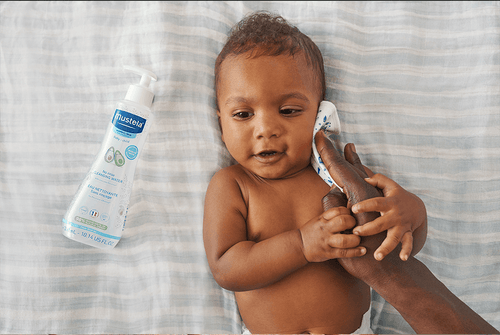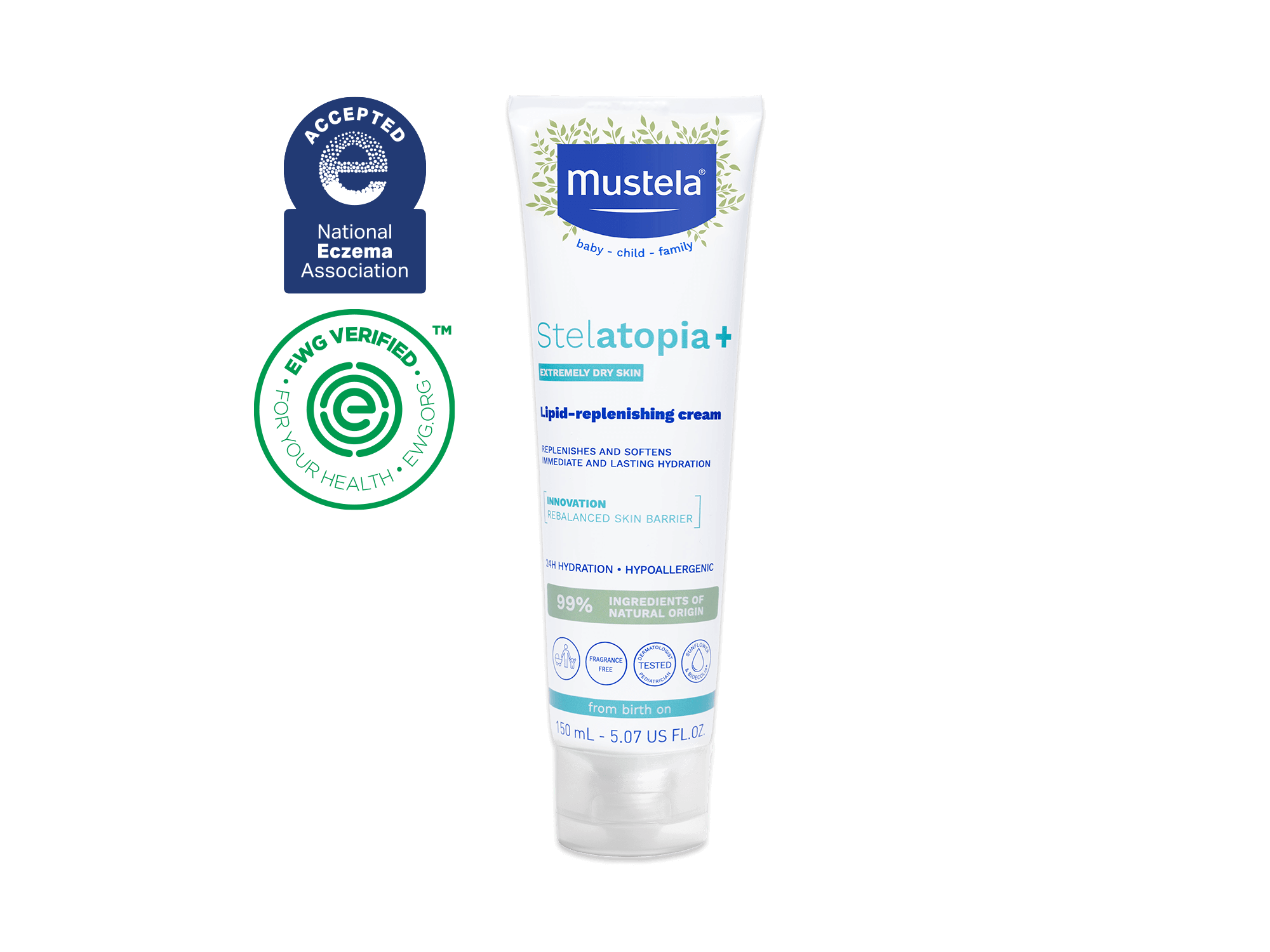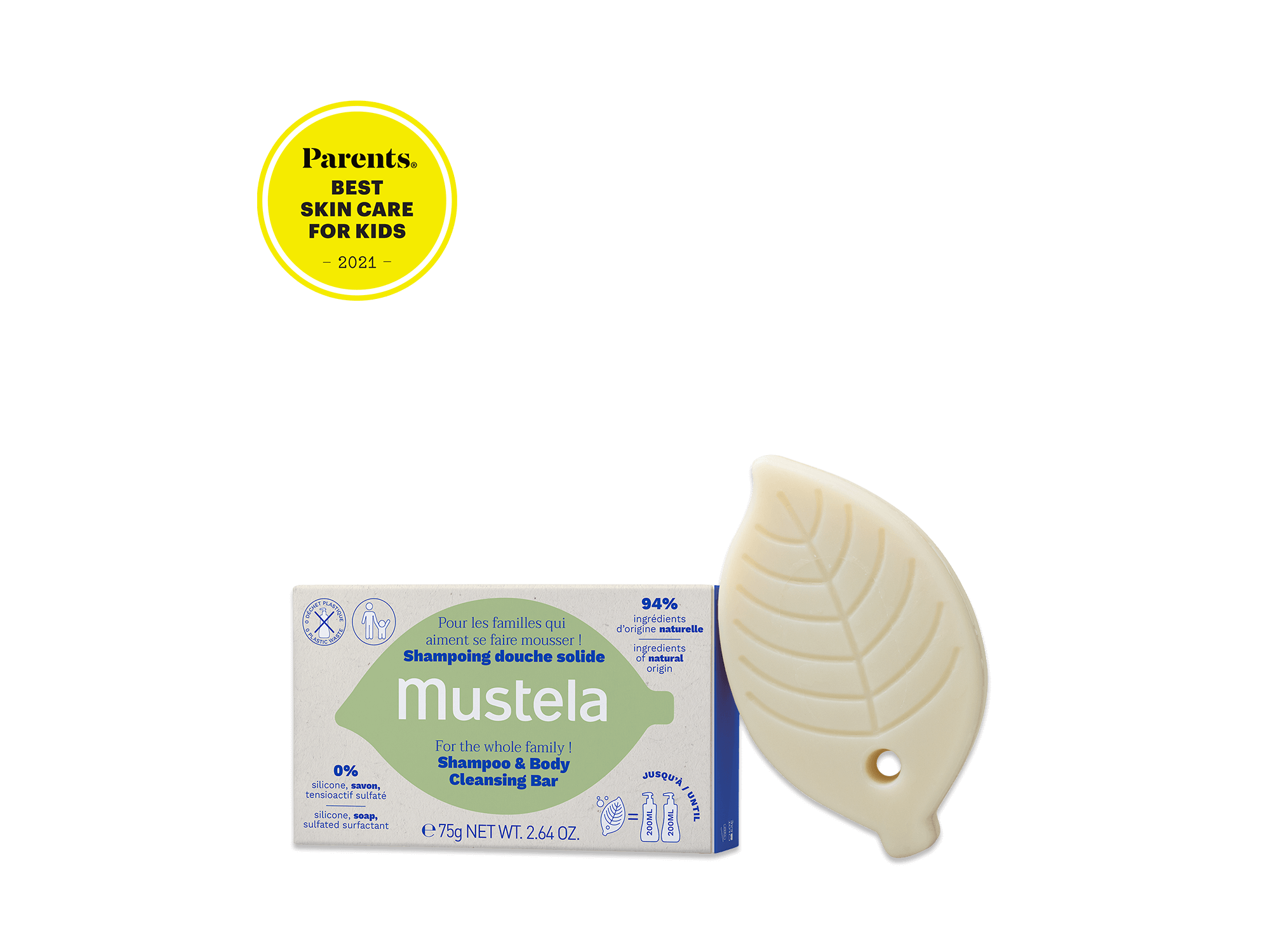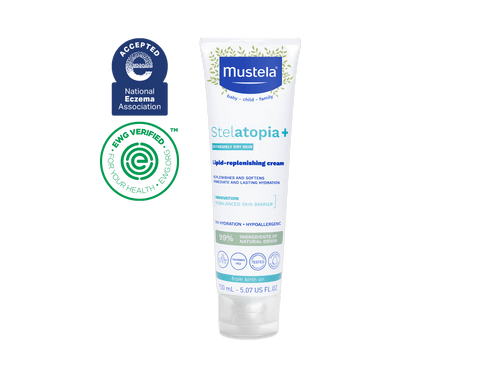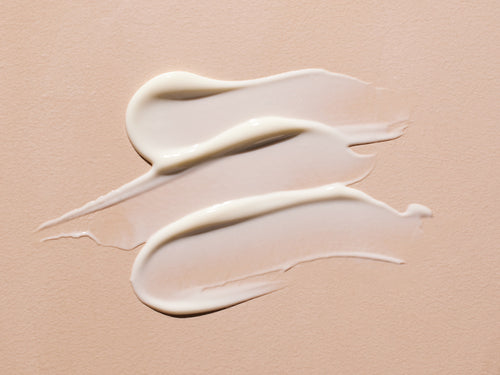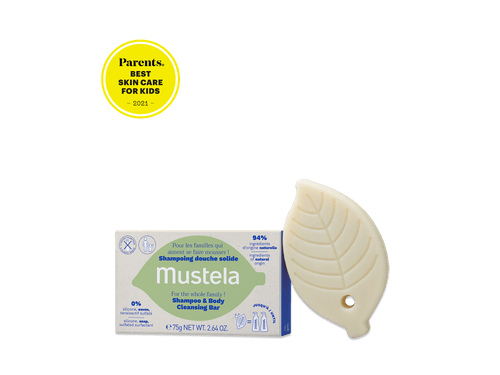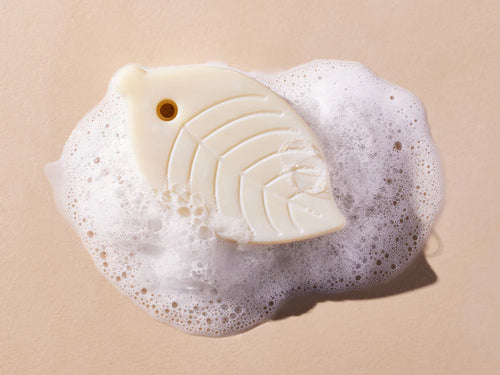Just when you finally settle into a good routine, your baby starts wanting to eat more and sleep less. If this sounds familiar, then you’re most likely dealing with one of many baby growth spurts that will happen over the next couple of years.
Specifically, your baby will have five to six growth spurts just during their first year. To help you survive these experiences, we’ll explain what growth spurts are, what signs to look for, and how you can deal with them.
Table Of Contents
- What Are Baby Growth Spurts?
- When Do Baby Growth Spurts Happen?
- Signs Of Baby Growth Spurts
- Tips For Surviving Your Baby's Growth Spurts
- Taking Care Of You And Your Baby
What Are Baby Growth Spurts?
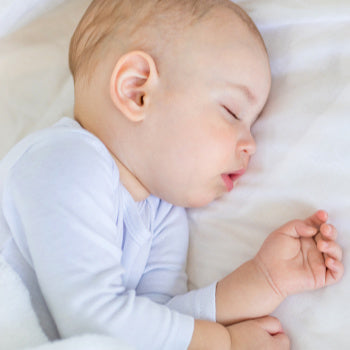
Baby growth spurts are pretty much what they sound like: intense periods of rapid growth. In fact, these spurts are part of a sprint babies put on to triple their weight and lengthen by almost a foot in their first year of life.
During this time, your baby requires additional calories for a specific growth. This usually happens because their body needs to restore depleted energy to the body cells that store energy.
Think of it like this: Your car’s battery sometimes needs to be recharged to function at full capacity. A growth spurt is a signal to your baby’s body that it needs to be “recharged” by getting extra calories.
This isn’t too different from the growth spurts children and teens experience!
When Do Baby Growth Spurts Happen?

Your baby’s most important job during their first year of life is to grow, grow, grow! Your little one should triple their birth weight by their first birthday. This doesn’t just happen by chance, though.
Enter: baby growth spurts.
The majority of your baby’s growth will come in these short, intense bursts and are sometimes unpredictable. This might be alarming to first-time parents dealing with a fussy baby who wants to eat all the time.
While growth spurts can happen anytime, generally, you can expect your baby to experience them around:
- 7 to 10 days after birth
- Three weeks
- Six weeks
- Three months
- Six months
- Nine months
Over these days and weeks, you may notice that your little one’s clothes fit a bit more snugly, and you’ll see differences in their weight and measurements when you take them to the pediatrician.
However, your little one won’t literally grow before your eyes. So, what are some of the things that can tip you off to the fact that your baby is going through a growth spurt? That’s what we’ll look at next.
Signs Of Baby Growth Spurts

Growth spurts are biological responses that affect both the breastfed baby and the bottle-fed baby. No baby is exempt!
Your little one’s growth spurt will usually last anywhere from one day to an entire week. Here are a few signs that your baby is going through one.
Waking Up From Naps Early Or Waking Up At Night
If your little one is waking up early from their naps or waking up in the middle of the night (assuming they’re already sleeping through the night), a growth spurt could be the reason.
But keep in mind that this could also mean your baby is teething, sick, needs a diaper change, or something else.
Pay attention to your little one’s mannerisms and patterns. If you’re noticing a pattern over a couple of days, then you’re most likely dealing with a growth spurt.
It’s also worth mentioning that if your baby was in a pattern of sleeping well and suddenly has trouble falling or staying asleep, it could mean you’re facing a sleep regression. Sleep regression typically happens around developmental milestones — both physical and mental.
For example, sleep might be hard to come by around the time that your baby learns how to roll over, starts crawling or walking, begins using words, or is old enough to miss you when you’re not around (yep, separation anxiety).
As you can see, sleep regression can happen at various points in the first couple of years of your baby’s life. To learn more about these tiring weeks and how to make it through, read our article here.
Seeming Extra Sleepy

As we just mentioned, some babies will have trouble sleeping during a growth spurt. On the contrary, sometimes babies sleep more than usual.
If your baby is taking longer naps or sleeping more at night, no need to wake them — unless it’s during their first week or two, and they haven’t gained back the pounds they lost after birth.
Otherwise, let them sleep. Their body needs the rest from all that growing!
Expert tip: To help your little one get a restful night of sleep, try Mustela’s Stelatopia Skin Soothing Pajamas! Using microcapsule technology, these 100% cotton pajamas deliver soothing moisture all night long so your little one can sleep soundly!
Although they’re designed for babies and toddlers with eczema-prone skin, any delicate, kissable baby skin will benefit from these comfy pajamas.
Each microcapsule contains five natural ingredients: avocado oil, sunflower oil distillate, squalane, ceramides, and vitamin E.
Avocado Oil works to maintain the skin's moisture barrier while sunflower oil distillate, known for its soothing properties, replenishes the skin with much-needed lipids.
These ingredients are activated when they come in contact with the skin and help to keep it soothed, comfortable, and moisturized all night long.
These pajamas also feature adjustable snap closures. Perfect for your quickly growing baby!
Learning New Tricks

Your baby won’t be able to roll over immediately after one growth spurt. But, over time, these growth spurts lead to your little one’s new tricks, like grasping a toy, rolling over, sitting up, crawling, and walking.
In addition to their body growing during these spurts, your baby’s brain also grows, causing their skull to fuse together. That’s why your baby’s soft spot is closed (or nearly closed) by their first birthday.
In fact, your little one’s brain isn’t just growing, it’s developing in complexity and absorbing as much about the world around it as possible.
This crucial development depends on a few basic things: proper nutrition, protection from toxins, and stimulating interaction with you and your family.
Your baby’s brain will develop best if you can keep your little one’s world as stress-free as possible. How? Nurturing, cuddling, soothing, and responding to your baby’s needs helps keep their environment secure and peaceful while protecting their brain from stress.
Eating More Frequently

Showing hunger cues more than normal is a tell-tale sign that your baby is going through a growth spurt.
If your little one normally eats every three hours and then all of a sudden wants to eat every one to two hours, what should you do? Rule of thumb: Feed your baby when they’re hungry!
This is especially important for breastfed babies. Your body produces your baby’s milk, and your baby will need more milk during growth spurts.
This sometimes leads to a behavior known as “evening cluster feeding,” which simply means your little one will want to nurse more frequently — in clusters — than normal. This could be every half hour or so leading up to normal bedtime.
Amazingly, this doesn’t mean your baby is starving or that you’re not producing sufficient milk. It’s just a natural way for your little one to signal your body to ramp up production because there’s a growth spurt coming on!
Feeding them when they’re hungry allows your body (i.e., your milk supply) to adjust to their changing needs.
If you’re bottle-feeding, gradually increase the amount of formula you give your baby. Be careful not to overfeed, though. If you notice your baby is spitting up more than usual, they’re probably getting too much.
Since your little one will be eating more often, now’s the time to stock up on Mustela’s Cleansing Wipes and No Rinse Cleansing Water for quick cleanups after every feeding!

Our Cleansing Wipes are true multitaskers and can be used for everything from wiping your baby’s bottom to cleaning their face and tiny fingers after a meal. You can use them, too, mom! These gentle wipes are effective at removing makeup without irritating your skin.
If you or your baby have extra-sensitive skin, opt for our fragrance-free Certified Organic Water Wipes with Cotton and Aloe.
And, for easy clean-up on the go, turn to our No Rinse Cleansing Water to thoroughly and gently clean your baby’s face, body, and diaper area. As the name implies, there’s no need to rinse with water!
It’s composed of 98% ingredients of natural origin per ISO 16128 standard and formulated with Avocado Perseose, a patented natural ingredient specifically designed to help protect your baby's delicate skin.
Plus, our cleansing water contains aloe vera leaf extract to soften and soothe.
Excessive Fussiness
This is a tricky one. Your baby can be fussy for several reasons. Number one is that they’re a baby.
Babies communicate by crying. Your little one could be sick, hurt, hot, cold, wet, dirty, teething...just to name a few reasons they may be trying to get your attention. For possible sickness, pay attention to your baby’s temperament and temperature.
But if your baby is fussy and showing signs of hunger and waking up early (or sleeping more), you can probably chalk it up to a growth spurt. But just like you did with their hunger cues, pay attention to your baby’s mannerisms.
Note: Baby growth spurts are easy to confuse with other issues, like teething. For example, if your little one is overly sleepy or fussy, they could be sick. And constant hunger could indicate a low milk supply if you’re nursing.
Frequent wet and dirty diapers are good indicators that your baby is getting enough milk. Just be sure you are changing their diaper frequently to help avoid skin irritation and diaper rash.
To soothe and protect your little one’s skin, apply a natural diaper cream to their bum at each diaper change.
Mustela’s Diaper Rash Cream 1 2 3 is a 3-in-1 product that prevents diaper rash and relieves and recovers your baby’s delicate skin. In fact, it’s clinically proven to soothe the diaper area and relieve irritation and redness from the very first time you rub it into your baby’s skin.
This diaper cream is made with 98% ingredients of natural origin per ISO 16128 standard and contains natural ingredients, like sunflower oil distillate, avocado perseose, and zinc oxide. Plus, it’s free of questionable and irritating ingredients, such as parabens, phthalates, and phenoxyethanol.
Another natural option is our EWG Verified Diaper Cream with Olive Oil and Aloe. This fragrance-free cream is safe for even the most sensitive skin and made with olive oil that is sourced from family-owned groves in the South of France.
This skin-friendly cream is also eco-friendly and designed to be environmentally conscious inside and out. The packaging is made from sustainably sourced sugar cane, and we’ve gotten rid of secondary cartons.

All of that being said, keep in mind that you may not necessarily notice that your baby is growing. Don’t worry. They still are! As long as everything looks good at their checkups, there’s no need for concern.
However, if you do have a sleepless baby and it seems that all you’re doing is feeding your little one, here are four tips to survive this time.
Tips For Surviving Your Baby’s Growth Spurts

Because growth spurts require your baby to be fed more often than normal, these times can be exhausting for both you and your little one. Take a look at our tips below for surviving (and thriving!) during growth spurts.
Maintain The Bedtime Routine
Even if you are exhausted and simply making it through the day is an achievement, don’t skip your baby’s bedtime routine!
Sticking to the routine will offer stability to the crazy days and, if your baby is having trouble sleeping, will remind them that it’s bedtime and (hopefully) help their bodies clue into the fact that it’s time to wind down and rest.
Remember that if you haven’t gotten into the habit of a bedtime routine, it’s never too late to start!
For many families, this includes calming activities, such as putting on pajamas, rocking and reading a book, singing, and a goodnight kiss. The important thing is to choose a routine that works for your family and stick to it every time.
You can also make a bath or baby massage part of the nighttime routine. Give your little one a soothing bath with skin-safe products, like Mustela’s Gentle Shampoo and 2 in 1 Cleansing Gel.

Both of these products are vegan, tear-free, and dermatologist- and pediatrician-tested. What’s more, we’re part of the B-Corp community.
B-Corp is an international label awarded to brands that demonstrate three-way economic, social, and environmental performance and develop their activities with a positive impact on society and the environment. This helps you have confidence in the products you’re using for your family.
Another possible activity to work into your baby’s bedtime routine: a baby massage!
Baby massages are the perfect way to protect your little one from stress. As we've seen, this can help with brain development. But the contact also helps your baby’s brain figure out how it’s connected to the world, helping them become more physically integrated with it.
Baby massages can also help settle colicky babies, increase weight gain and muscle tone, and even help your little one’s immune system develop! And, of course, massages are the perfect way to help your baby sleep better.
With a bit of our Baby Oil, a massage will both moisturize your baby’s skin and provide all sorts of other benefits. This oil is composed of 99% ingredients of natural origin per ISO 16128 standard and enriched with an elixir of pomegranate seed oil, sunflower seed oil, and avocado oil.
Read more here about how to give a baby massage and what it can do for your little one.

Help Your Baby Sleep
Another way to help your baby if sleep is hard to come by while they’re going through a growth spurt is by making the conditions in their nursery conducive to sleep. They may need all the help they can get to fall asleep and stay asleep!
Keep all screens out of the nursery, and start turning lights down an hour or two before bedtime. Also, keep the temperature in your baby’s room cool. There’s no magic temperature for sleeping babies, but somewhere between 68 and 72 degrees Fahrenheit is usually good.
And, of course, keep the house as quiet as possible and, if necessary, use a noisemaker.
Stay Hydrated
This one is for the breastfeeding mom. As we mentioned above, your body is going to experience changes along with your baby’s during growth spurts. Take care of yourself.
It’s important to stay hydrated by drinking plenty of water! Aim to drink a glass of water during each feeding session to help keep up your milk supply and keep you healthy.
Guzzling a glass of water isn’t the only way to pump water into your cells. Get creative with hydration and sip on herbal tea, make your own infused water, or eat extra fruits and veggies with high water content, like watermelon, tomatoes, and cucumbers.
Call In Back-Up And Clear Your Schedule
If all you feel like you’re doing is feeding a baby, then you’re probably doing something right! This is all you’ll be able to do during growth spurts.
It’s exhausting, and it’s hard work. So call in back-up for things like household chores and cooking.
Remember, this will only last a week at most, so try to relax and understand that on those days, nothing else may get accomplished — and that’s OK!
Don’t Compare
All babies grow at their own pace, so don’t compare your baby’s size to another baby’s of the same age.
At your little one’s regular wellness visits, the doctor will measure their length and head circumference and check their weight to make sure they’re growing as they should.
Your baby will have a wellness visit at one week (or before and possibly a little after), one month, two months, four months, six months, nine months, and 12 months. Do you see a pattern? Growth spurts usually occur around those milestone wellness visits.
That said, don’t hesitate to reach out to your baby’s doctor if you have any concerns between wellness visits!
Likewise, if you’re breastfeeding, contact a lactation consultant if you need help, advice, or just some encouragement. That brings us to our final point: take care of your breasts.
Take Care Of Your Breasts

Frequent feeding sessions increase your milk supply, which can trigger uncomfortable engorgement for you.
Care for your engorged breasts by hand-expressing your milk or by nursing your baby. Breast pumping can also help alleviate the pain in extreme circumstances.
Frequently nursing your baby can also lead to sore nipples. To keep your skin comfortable while breastfeeding, apply Mustela’s Nursing Comfort Balm.
This soothing and restorative nipple cream moisturizes and protects your nipples, eases discomfort, and helps to replenish and restore your skin during and after breastfeeding.
And you can feel good about putting it on your skin. It’s made with 100% ingredients of natural origin per ISO 16128 standard and is vegan, lanolin-free, fragrance-free, dye-free, and has a neutral smell and taste.
Rest assured that this formula is backed by scientific research, developed in collaboration with healthcare professionals, and tested under dermatological control. It’s proven safe for moms and babies, so you can be at ease.
Apply Nursing Comfort Balm generously to your nipples after feeding your little one and clean your nipples before each breastfeed.
Taking Care Of You And Your Baby

During your baby’s first year, they will rely solely on you for comfort and food. That means baby growth spurts affect you as much as they affect your little one!
Fortunately, you’ll get the hang of how to survive them after the first few growth spurts. And you can find relief knowing each one only lasts for a few days.
Mustela cares for you and your baby. We’re here to help you not only survive but thrive during your little one’s growth spurts.
Take care of yourself with our skincare line for moms and products like Nursing Comfort Balm. And give your baby the best skin care with our Newborn Arrival Gift Set, 2 in 1 Cleansing Gel, and Diaper Cream with Olive Oil and Aloe Vera.
As your baby grows, choose from a variety of products designed to treat your baby’s specific skin needs during every phase of their precious life!

